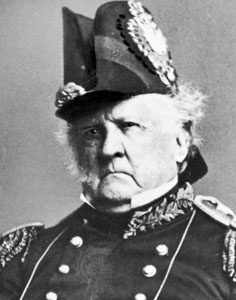Scott, Winfield
United States general
born June 13, 1786, Petersburg, Va., U.S.
died May 29, 1866, West Point, N.Y.
 American army officer who held the rank of general in three wars and was the unsuccessful Whig candidate for president in 1852. He was the foremost American military figure between the Revolution and the Civil War.
American army officer who held the rank of general in three wars and was the unsuccessful Whig candidate for president in 1852. He was the foremost American military figure between the Revolution and the Civil War.Scott was commissioned a captain of artillery in 1808 and fought on the Niagara frontier in the War of 1812. He was captured by the British in that campaign, but he was exchanged in 1813 and went on to fight in the battles of Chippewa (July 5, 1814) and Lundy's Lane (July 25), where his success made him a national hero. By war's end he had attained the rank of major general. Scott remained in military service, studying tactics in Europe and taking a deep interest in maintaining a well-trained and disciplined U.S. Army. In 1838 he supervised the removal of the Cherokee Indians from Georgia and other Southern states to reservations west of the Mississippi River. Scott became commanding general of the U.S. Army in 1841 and served in that capacity until 1861.
With the outbreak of the Mexican War (Mexican-American War) (1846–48), Scott recommended General Zachary Taylor for command of the U.S. forces. When Taylor appeared to be making little progress, however, Scott set out himself with a supplementary force on a seaborne invasion of Mexico that captured Veracruz (March 1847). Six months later, after a series of victories, including those at Cerro Gordo, Contreras, Churubusco, Molino del Rey, and Chapultepec, Scott entered Mexico City on September 14, thus ending the war. For this service he was honoured by appointment to the brevet rank of lieutenant general. Despite—or perhaps because of—the fact that he was clearly the most capable American military leader of his time, Scott was bedeviled by political opposition throughout his career. And though he was highly popular with his men, he earned the nickname “Old Fuss and Feathers” because of his emphasis on military formalities and proprieties.
A prominent Whig, Scott won his party's presidential nomination in 1852 but lost the election to Democrat Franklin Pierce, mainly because the Whigs were divided over the issue of slavery. In 1855 he was promoted to lieutenant general, becoming the first man since George Washington to hold that rank. Scott was still commander in chief of the U.S. Army when the Civil War broke out in April 1861, but his proposed strategy of splitting the Confederacy—the plan eventually adopted—was ridiculed. Age forced his retirement the following November.
Additional Reading
Charles Winslow Elliot, Winfield Scott: The Soldier and the Man (1937, reprinted 1979), was for 60 years the standard treatment. John S.D. Eisenhower, Agent of Destiny: The Life and Times of General Winfield Scott (1997), is an updated examination of his life. Timothy D. Johnson, Winfield Scott: The Quest for Military Glory (1998), adds a refreshing new perspective.
- Elizabeth Arden
- Elizabeth Barrett Browning
- Elizabeth Barton
- Elizabeth Bishop
- Elizabeth Blackwell
- Elizabeth Bowen
- Elizabeth Cabot Agassiz
- Elizabeth Cady Stanton
- Elizabeth Cady Stanton: The Solitude of Self
- Elizabeth Carter
- Elizabeth Catlett
- Elizabeth City
- Elizabeth Cleghorn Gaskell
- Elizabeth Fries Lummis Ellet
- Elizabeth Fry
- Elizabeth Garrett Anderson
- Elizabeth Gertrude Knight Britton
- Elizabeth Graeme Ferguson
- Elizabeth Gurley Flynn
- Elizabeth Hardwick
- Elizabeth Harrison
- Elizabeth I
- Elizabeth II
- Elizabeth Inchbald
- Elizabeth Islands